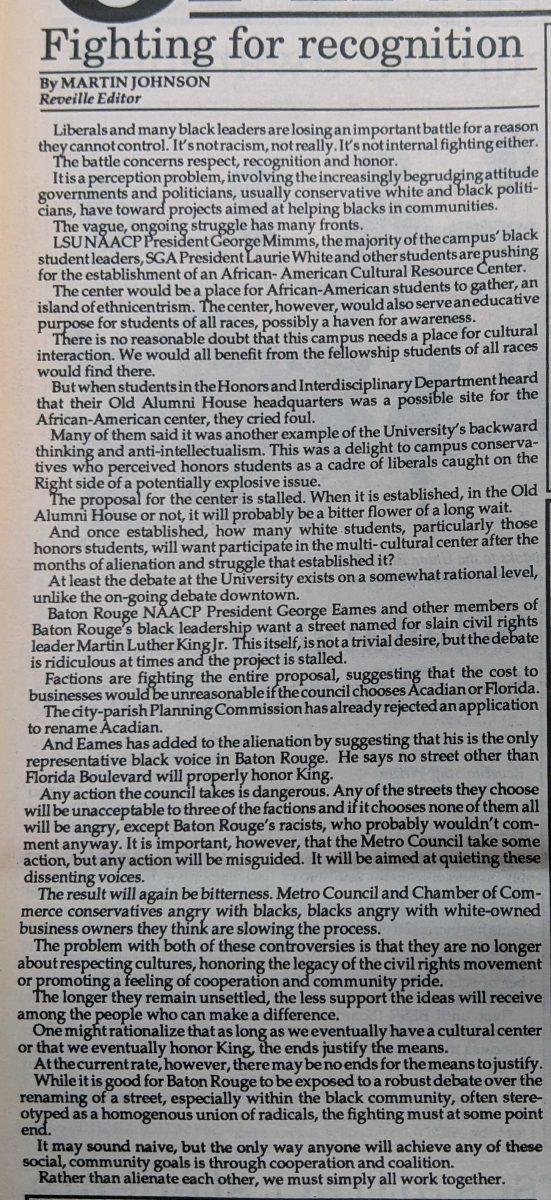Liberals and many black leaders are losing an important battle for a reason they cannot control. It’s not racism, not really. It’s not internal fighting either.
The battle concerns respect, recognition and honor.
It is a perception problem, involving the increasingly begrudging attitude governments and politicians, usually conservative white and black politicians, have toward projects aimed at helping blacks in communities.
The vague, ongoing struggle has many fronts.
LSU NAACP President George Mimms, the majority of the campus’ black student leaders, SGA President Laurie White and other students are pushing for the establishment of an African-American Cultural Resource Center.
The Center would be a place for African-American students to gather, an island of ethnocentrism. The center, however, would also serve as an educative purpose for students of all races, possibly a haven for awareness.
There is no reasonable doubt that this campus needs a place for cultural interaction. We would all benefit from the fellowship students of all races would find there.
But when students in the Honors and Interdisciplinary Department heard that their Old Alumni House headquarters was a possible site for the African-American center, they cried foul.
Many of them said it was another example of the University’s backward thinking and anti-intellectualism. This was a delight to campus conservatives who perceived honors students as a cadre of liberals caught on the Right side of a potentially explosive issue.
The proposal for the center is stalled. When it s established, in the Old Alumni House or not, it will probably be a bitter flower of a long wait.
And once established, how many white students, particularly those honors students, will want to participate in the multi-cultural center after the months of alienation and struggle that established it?
At least the debate at the University exists on a somewhat rational level, unlike the on-going debate downtown.
Baton Rouge NAACP President George Eames and other members of Baton Rouge’s black leadership want a street named for slain civil rights leader Martin Luther King Jr. This itself, is not a trivial desire, but the debate is ridiculous at times and the project is stalled.
Factions are fighting in the entire proposal, suggesting that the cost to businesses would be unreasonable if the council chooses Acadian or Florida.
The city-parish Planning Commission has already rejected an application to rename Acadian.
And Eames has added to the alienation by suggesting that his is the only representative black voice in Baton Rouge. He says no other street than Florida Boulevard will probably honor King.
Any action the council takes is dangerous. Any of the streets they choose will be unacceptable to three of the factions and if it chooses none of them all will be angry, except Baton Rouge’s racists, who probably wouldn’t comment anyway. It is important, however, that the Metro Council take some action, but any action will be misguided. It will be aimed at quieting those dissenting voices.
The result will again be bitterness. Metro Council and Chamber of Commerce conservatives angry with blacks, blacks angry with white-owned business owners they think are slowing the process.
The problem with both of these controversies is that they are no longer about respecting cultures, honoring the legacy of the civil rights movement or promoting a feeling of cooperation and community pride.
The longer they remain unsettled, the less support the ideas will recieve among the people who can make a different.
One might rationalize that as long as we eventually have a cultural center or that we eventually honor King, the ends justify the means.
At the current rate, however, there may be no ends for the means to justify. White it is good for Baton Rouge to be exposed to a robust debate over the renaming of the street, especially within the black community, often stereotyped as a homogenous union of radicals, the fighting must at some point end.
It may sound naïve, but the only way anyone will achieve any of these social, community goals is through cooperation and coalition.
Rather than alienate each other, we must simply all work together.
This 1991 article has been digitized by The Reveille’s Digital Staff in honor of Dean Martin Johnson, who graduated from the Manship School of Mass Communication in 1991 and was an editor for The Reveille during his time at LSU.





